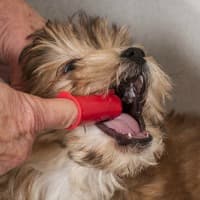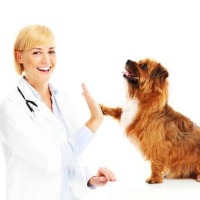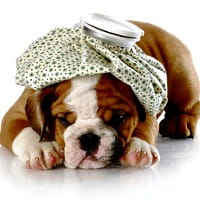FYI: If you buy something through a link on this site I may earn a commission - at NO extra cost to you.
Dog Dental Care
Providing good dog dental care is an important part of your responsibilities as a pet owner, and a clean mouth is usually a happy mouth!
Strong, white, sharp.... all of these describe your puppy's teeth.
If you care for them properly those descriptions will be as accurate when Fido is 10 years old as they are when he's 10 weeks old!
But if you don't take good care of your dog's teeth, he could eventually end up with dental problems such as tartar build-up, cavities, abscesses, tooth-loss etc.
These aren't just painful for him, but can also lead to more serious issues such as heart or kidney disease, chronic inflammation and more. Luckily there are lots of ways in which you can help your Fido's teeth stay clean, sharp and healthy.
Use these quick links to jump to the specific info. you're looking for, or simply scroll down to get an in-depth look at good dog dental care....
- Caring for your puppy's teeth
- The importance of good dog dental care
- Taking care of your adult dog's teeth
- The three major signs that your dog needs the doggie dentist
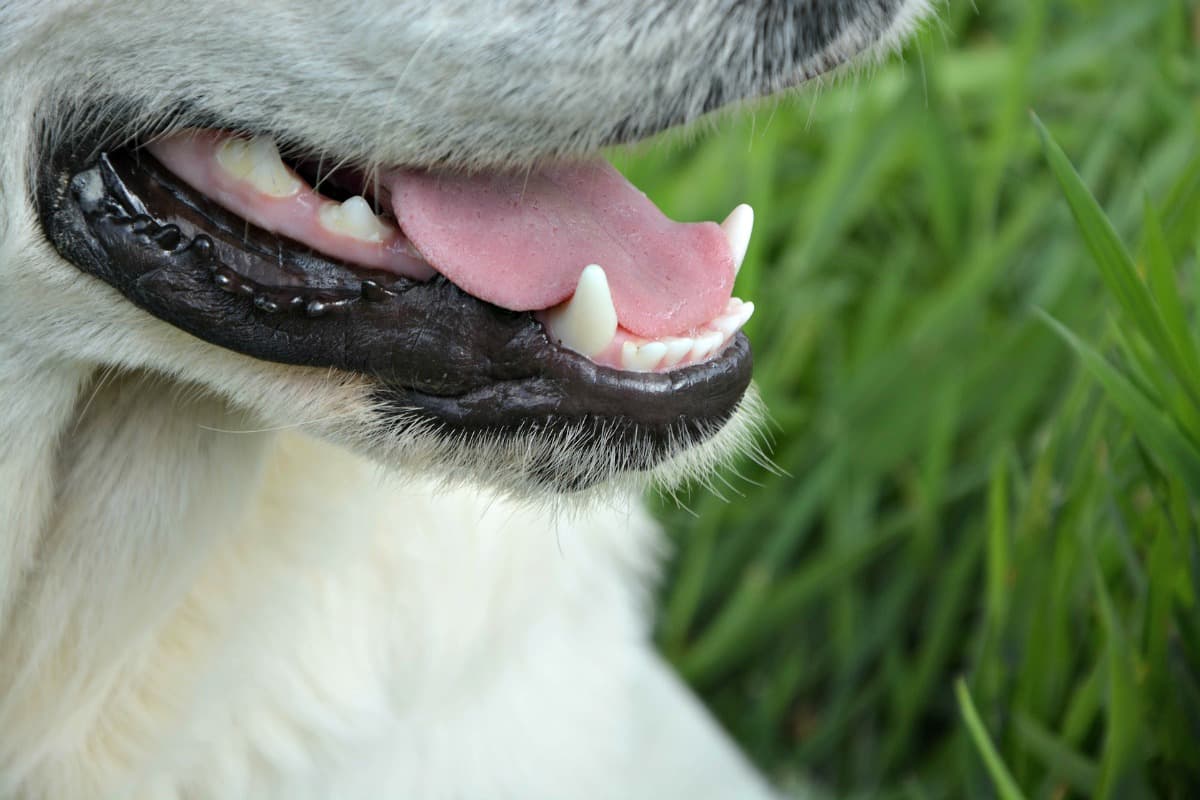
Caring For Puppy Teeth
Your pup should have all his sharp little 'baby' teeth in place by the time he's approximately 8 weeks old. After a month or so, he starts to lose them one by one, and his big, adult teeth begin to appear.
During this period he's teething, and you'll probably notice an increase in the amount of biting and chewing he does - and how intense he is about it! This is a normal developmental stage, and there's very little input needed from you.
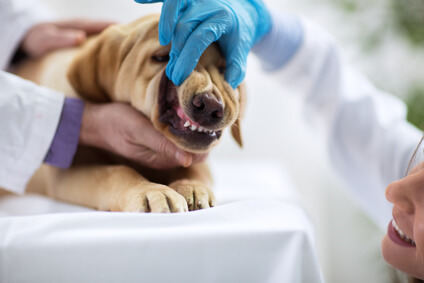
Loose puppy teeth almost always fall out by themselves without any problems, and the only help with puppy teething that your little guy (or girl) needs comes in the form of plenty of appropriate puppy teething toys, and some TLC if he's cranky or uncomfortable.
Chewing is a very natural way for your puppy to keep his tiny pearly-whites, well... pearly-white!
There are tons of dog toys designed to help a pup who's in the throes of teething, and many others that are made with ridges, rough surfaces and other features which help keep tartar at bay in older pups and dogs.
There are also dog dental treats which can help clean your pet's teeth and freshen his breath.
All of these are a very simple form of basic dog dental care, and are effective - up to a point, but you still need to clean your dogs' teeth regularly, either at home or by getting a professional dental cleaning at a veterinary clinic.
The importance of chew toys in dental health
Don't underestimate the value of chewing on certain toys or bones when it comes to keeping Fido's teeth clean, strong and healthy!
Natural antlers, hooves, Nylabone (or similar) chew toys, rope toys are all an excellent, and fun, way for your dog to keep tartar from building up on his teeth. Dental chews are also a great option, but as they're edible there's a limit to how many you can give, and therefore the duration of their entertainment value
I have two dogs, Ivan is an approx. 10 year old mixed breed I adopted from our city pound seven years ago. He LOVES to chew (so much so that he isn't allowed soft toys, or rubber toys, or anything remotely destructable!).
Ivan is now about ten years old, never had a dental cleaning, and has healthy teeth and gums with minimal tartar.
I also have a 3 year old German Shepherd, Dax. This guy refuses to chew anything, and the only toy he loves is his stuffed rooster (which has to be replaced regularly... not because he chews it, but because he sleeps with it and carries it around ALL the time).
Dax recently had to have a dental cleaning, because he hates having his teeth brushed.... if he chewed on bones and toys the way Ivan does, this wouldn't have been necessary!
You don't actually NEED to brush your puppys' 'baby' teeth, but it's definitely much easier to get a puppy familiar with tooth-brushing than it is an adult dog.
Puppies learn through repetition, and the things they learn during puppy-hood tend to stick with them forever... there is a seed of truth in that old saying 'you can't teach an old dog new tricks'.
You can in fact teach a mature dog new things, and he WILL pick them up, but puppies will do so much faster - and with less resistance or fuss.
If you make dog dental care a regular part of your puppy's grooming routine and he'll soon come to accept it.... even if he never learns to LOVE it!
We all know how to brush our own teeth right?
But brushing dog teeth isn't exactly the same, so to make sure that you start out in the right way (and that your pup gets the maximum benefits from your efforts) check out this page.
It has all the tips and advice you need.......
Why Good Dog Dental Care Is So Important
Here's my son's Pitbull, Bosco, showing us how well-cared for teeth can look...
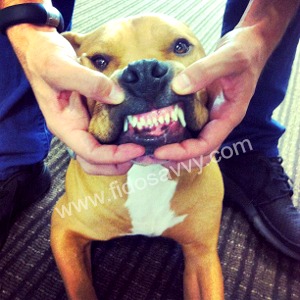 Don't you just love that big Pittie smile?
Don't you just love that big Pittie smile?If you don't take good care of your dogs' teeth he's very likely to develop Periodontal Disease, probably by the time he's three or four years old.
Periodontal Disease is the most common dental problem seen in dogs. Professional surveys indicate that this condition affects approximately 60% of dogs, to varying degrees, more informal estimates sometimes put the incidence as high as 85%.
It begins with tartar (calculus) build-up on the surface of the teeth, and unchecked can lead to bad breath, inflammation and infection of the gums, tooth decay and tooth loss.
The bacteria from infection and the inflammatory properties can also leak into your pet's blood system and cause damage to his heart and other major organs.
Smaller breeds tend to have develop tooth/gum problems more easily, and quickly, than larger breeds. Short-muzzled breeds such as Bulldogs, Boston Terriers and Pugs suffer from the same concerns. This is because for these breeds, their mouths are small/short and often over-crowded with teeth. There's also less surface area per tooth so even a little bit of damage can cause big problems.
Fido can't tell you if his tooth or mouth hurts, and dogs often have high pain thresholds and don't show that they're hurting or in discomfort until things have become serious.
Being familiar with your dogs' mouth and teeth, and touching them regularly will help you notice little problems early... and help you prevent them from turning into big problems!
Fortunately the pain, discomfort and dangers caused by gum disease and/or tooth decay can largely be prevented by brushing your dogs' teeth regularly, and by making sure he gets routine dog teeth cleaning procedures taken care of at the veterinary clinic.
Caring For Your Adult Dogs' Teeth
As with taking care of a puppys' teeth, good dog dental care involves regular brushing/cleaning of his teeth at home, as well as making sure that a thorough and professional dental cleaning is given annually.
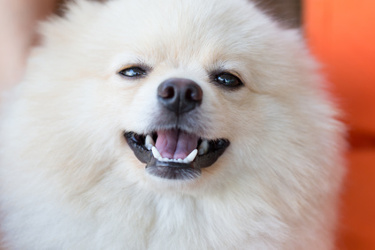
If you start incorporating dental care into your pups' routine from the very beginning, it gives him a huge advantage in overall health. Proper dog dental care should include a weekly (or bi-weekly) examination of Fido's mouth.
There are now loads of different dental products available for dogs.
It's important to choose the right dog dental care products and only use those designed for dogs.
Human brushes are the wrong shape and size and human toothpaste contains ingredients which are dangerous for your dog, so don't try to make-do.
- Doggie toothbrushes (including finger brushes')
- Dog toothpaste
- Drops or additives for Fido's water bowl
- Dental treats, bones, toys etc.
Chewing on a textured surface is one of the best way to keep tartar at a minimum so I prefer to offer my dogs rope toys, bones and other durable toys.
I'm not the biggest fan of edible dental chews because the effects like fresher breath are often very temporary, and my dogs can often literally eat the chew in minutes.
However, my boys really enjoy Whimzees dental chews and there's a noticeable improvement in their breath, (which lasts for longer than a few minutes!) and as Dax isn't keen on chewing anything but will happily do so on these, I'm in!
Whimzees have a fairly short ingredients list and contain no artificial additives as well as being gluten free.
Another new addition to our arsenal are Yummy Combs. The unique honeycomb shape of these veterinarian recommended chews creates pockets which have a floss-like effect and my dogs love them. The ingredients include quality animal protein and they're non-GMO as well as grain free.
If you decide to give your dog/s dental chews there are couple of things to remember...
- Be sparing with them. One per day is more than enough.
- Choose the appropriate sized treat for your dogs physical size
- If your dog has a sensitive tummy be even more sparing, and watch for any changes such as diarrhea or vomiting to begin with
- Examine the ingredients list so you know what your dog is ingesting
Also, don't skimp on professional dental cleanings for your dog because a proper examination and investigation of your dogs' mouth can reveal problems that aren't visible to the naked eye.
Things like cavities, gum abrasions, cracked or broken teeth and so on are pretty easily picked up if you're brushing your dogs' teeth regularly and examining the inside of his mouth.
But issues below the gum-line, oral tumors, abscessed teeth are unlikely to be noticed (or visible) and these can all be painful and potentially serious if left untreated.
The Ultimate Dog Teeth Cleaning Guide!
Here's where you can find out everything you need to know about cleaning your adult dogs' teeth.
Includes a step-by-step guide to brushing Fidos' teeth at home, information about professional veterinary dental procedures (and why they're necessary), plus a look at the best, and most popular, dog dental care products available.
Find it all here.... Dog Teeth Cleaning 101
Signs of Dog Dental Problems
Puppy breath should be sweet smelling - it's one of the things that I love about tiny puppies!
Generally you don't really need to worry about bad breath while Fido is still a baby puppy. Unfortunately for older for older pups and adult dogs, bad breath is much more common, BUT it doesn't have to be a fact of life.
Good dog dental care can prevent smelly breath from spoiling those doggie-kisses, and there are lots of dental treats, chews, supplements and other products that can help.
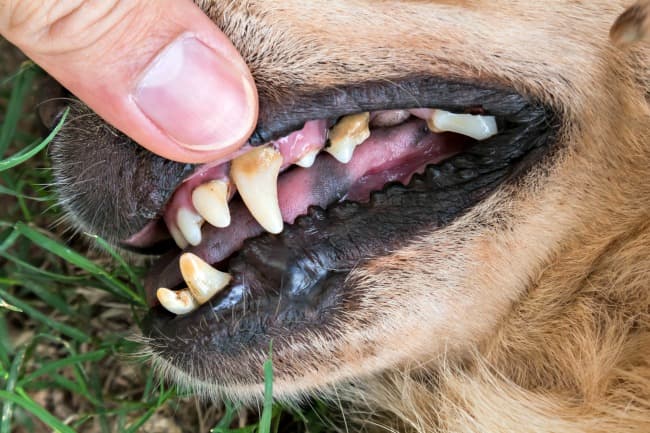
Sometimes, bad breath in dogs can be a sign of illness or an underlying health condition, so if the usual measures don't seem to help, or you notice any of these symptoms, get your pet to your own veterinarian for a check up.
Some of the most common signs that your puppy or dog is having dental problems include:
Drooling
This can be a problem if you own a mastiff or one of the 'drooly' breeds, but you know your own dog. Excessive drooling in a normally 'dry' dog could be a sign of teeth or gum problems, but it could also be result of poisoning, or other health problems. If your pup seems to be drooling more than usual get your vet to check him out asap.
Loss of appetite
If his teeth or gums hurt your dog is (sensibly) less likely to be keen on eating. He may turn away from food or treats, especially if they're hard or crunchy. If you've ever had a toothache you'll totally understand this!
difficulty eating/chewing
Often dogs with dental health problems will try to chew, but will keep dropping the food as if it were too hot. It could be that he has an abscess, inflamed gums, or decay... or he could have a piece of stick or something sharp stuck between his teeth, or in his gums. Your vet will be able to get a closer look and decide what's going on.
Also be on the lookout for:
- Red, swollen or inflamed gums
- Gums that seem to be receding from the base of the tooth
- Lumps on growths on his gums, lips, cheeks or on/under his tongue
- Loose teeth
- Heavy tartar build-up - yellow/brown deposits, heaviest at gum line
- Broken teeth
- Areas of decay or discoloration
- Very pale gums - possible heart problems, anemia or more
Any of these could mean that there's trouble brewing and your dog needs a vet check to make sure that everything is okay.
you might also like...
- Home
- Dog Dental Care
FTC Disclosure: Some pages on this site contain affiliate links. I may earn on qualified purchases.

